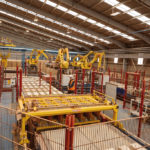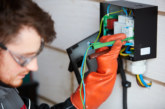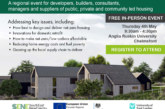The housebuilding sector has a huge responsibility – and opportunity – to adopt sustainable, low-carbon practices. Michael McGowan, Group Sustainability Manager at Ibstock, explains how it is working to deliver a more sustainable future.
Across the UK the built environment is responsible for 25% of greenhouse gas emissions, according to the UK Green Building Council. Whilst there are many initiatives and frameworks to reduce emissions from buildings during their lifetime it is clear that more can, and should, be done. Significant action is already being taken to achieve this as the housebuilding sector responds to the challenge, but there is no time to waste.
Many of our European counterparts, such as France and the Netherlands, have already established mandatory whole-life carbon assessments for buildings. The Environmental Audit Committee (EAC) recently warned that the lack of impetus or policy levers to assess and reduce emissions from the construction of residential and commercial buildings could leave the UK lagging behind.
Building homes for the future
Legislation in one of the key influencing factors for designing and constructing homes that are more sustainable. Under changes to Building Regulations in June, CO2 emissions from new build homes in England need to be around 30% lower than current standards to help the country move towards net zero. Such changes aim to raise standards and have been viewed as an important step towards a cleaner, greener built environment, paving the way for the Future Homes and Buildings Standard in 2025.
Housebuilders are responding to these changes, using modern methods of construction and more sustainably manufactured traditional building products. With the growing movement in data transparency, this will enable the sector to demonstrate the difference it is making.
Examples of homes that are fit for the future are springing up across the country three years ahead of schedule as developers get to grips with how to deliver homes that meet new regulations. For example, Midland Heart Group has delivered 12 homes in Birmingham that meet the Future Homes Standard as part of Project 80, whilst Barratt Developments has launched its flagship zero carbon concept home, the Z House in Salford.
Manufacturing materials for life
As a key supplier to the housebuilding sector, we’re committed to helping our housebuilder customers deliver homes that are fit for the future. At a time when there is a real and tangible demand for transparency, our ESG Strategy to 2030 defines a new era of responsible business and manufacturing. The focus of this is on Addressing Climate Change; Improving lives; and, possibly the most important for our housebuilder customers, Manufacturing Materials for life.
With the increasing focus on the whole life impact of materials we’ve taken active steps to evolve our core range so we can deliver more sustainable building products. We’re exploring new methods of manufacturing, reducing virgin materials and utilising secondary aggregates, eliminating plastics and seeking lower carbon alternatives to reduce the embodied carbon and weight of our products. For example, introducing SustainaCem into our concrete roof tiles we can offer a product which has equal strength and durability with a 15% lower carbon cement.
As the sector continues to transform, we are further futureproofing our product range so we can offer our customers a diversified portfolio. Led by our Ibstock Futures Division, we’re focusing on the development of new technologies, products and solutions to support the growth in sustainability and more modern methods of construction. As part of this we are building the UK’s first automated brick slips factory at our Nostell site in Yorkshire.
Longer term goals
With 11% of global carbon emissions attributed to construction products and processes our responsibilities are clear. To fully decarbonise the sector requires eliminating both embodied carbon emissions and operational emissions, and we’ve recognised the importance of building a more sustainable future through our own operations. With our original target to of 15% reduction in carbon emissions per tonne of production, achieved ahead of time, we have set a new objective of a 40% reduction in absolute scope 1 and 2 carbon by 2030 and will be a Net Zero business by 2040.
As we work towards our long-term goal of decarbonising our operations, we’ve invested more than £115m in state-of-the-art manufacturing facilities. For example, Our West Midlands-based Atlas factory will be a pathfinder project to test and pilot operational efficiencies which we believe will lead it to become the world’s only Scope 1 & 2 Net Zero brick factory, whilst Nostell will incorporate the latest manufacturing technology to significantly reduce carbon emissions.
Fostering collaboration
Sustainability cannot be achieved in isolation and collaboration is a linchpin of success. As such, we have found it imperative to work closely with stakeholders, suppliers and customers on common challenges and priorities. In doing so it has provided a platform for us to co-create solutions and catalyse leading-edge innovation not only within production processes but also in the development of future building products. This way of working benefits both us and our partners and ultimately adds value to our customers.
Being members of the Supply Chain Sustainability School highlights the importance we place on having a common approach to addressing sustainability throughout the value chain. Not only does it allow us to keep track of continuous improvement, but it shows our customers that we are on a sustainability journey with them.
There is no doubt sustainability and climate challenges will remain for many years to come. Yet we have our eyes firmly set on the future and see it as an opportunity to think differently. By working with our customers, we’re focused on helping them deliver homes that are fit for today, and tomorrow.









